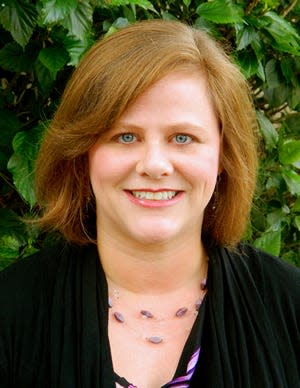WANTED: Healthy brains
The number of people impacted by dementia keeps increasing.
So does the need for research on reducing risk of developing Alzheimer’s disease, the leading cause of dementia, as well as research aimed at earlier detection.
The University of South Florida’s Preventing Alzheimer’s with Cognitive Training (PACT) study already drew 1,800 older, brain-healthy adults from Polk and other Tampa Bay area counties.
Now 2,000 more enrollees from this area are needed.
The expanded study seeks to definitively answer whether specific computerized brain training exercises can reduce risk of developing cognitive impairment and Alzheimer’s disease.
People 65 or older may qualify if they don’t have dementia, mild cognitive impairment or any neurological disorders. They can’t have had a stroke or other brain injury.
Mild cognitive impairment causes subtle yet noticeable changes in memory and thinking.

“The only way we are going to find effective ways to diagnose and prevent dementia is through clinical trials,” said Dr. Jerri Edwards, principal investigator in the study. She has a doctorate in developmental psychology and is a professor in USF Health’s Department of Psychiatry and Behavioral Neurosciences.

“To get 2,000 enrolled, we need to screen at least double that number,” said Dr. Aryn Harrison Bush, a USF research professor and vice president of science and translation and director of brain health and cognition at Reliance Medical Centers.
Reliance partners with USF in the PACT study, said Bush, whose doctorate is in applied cognitive neuroscience.
Enrollment in PACT can be done through Reliance’s Lakeland or Winter Haven locations or at USF campuses in Tampa and St. Petersburg.
Contact numbers are 863-800-0835 for Polk, 813-974-6703 for Hillsborough and 727-873-4090 for Pinellas counties. Its website is www.pactstudy.org .
Since the study began in 2018-19, it’s added other sites at the University of Florida, Clemson University, University of North Florida and Duke University.
PACT participants now can contribute further to the fight against Alzheimer’s, Edwards said, because a new component has been added.
Fueled by additional funding of $3.2 million, USF is collecting blood samples from study participants for research into whether simple blood tests can detect Alzheimer’s disease early.
People can take part in the PACT study of computerized brain training without being required to give blood.
They can’t give blood samples without being part of PACT, however.
WHY LOOK AT BLOOD
That new money comes from the National Institute on Aging, part of the National Institutes of Health. PACT researchers will work with the National Centralized Repository for Alzheimer’s Disease and Related Dementias in analyzing blood specimens from study participants.
They’ll look for which specific biomarkers may predict Alzheimer’s disease, the severity of the disease and responsiveness to treatment.
“NIH asked us to update our procedures based on the state of science,” Edwards explained. “We now have blood tests in development that have shown they can detect Alzheimer’s related pathology.”
Being able to measure these and other biomarkers “is going to revolutionize medicine,” she predicted.
Biomarkers are biological changes that can be measured to help identify presence of a disease or risk of developing one. Increased cholesterol, for example, is a biomarker used in determining risk of heart attacks.
Two changes associated with Alzheimer’s are beta-amyloid plaques (clumps of a protein fragment) and an abnormal form of tau (a protein). The blood samples to be collected could help improve blood tests for detecting those changes, reducing the need for more invasive procedures like checking fluid surrounding the brain.
“Those are two of the potential biomarkers,” Bush said. “There are a lot we don’t know.”
WHAT PACT INVOLVES
Participants make a three-year commitment, but most of the work is done at home. Only three in-person visits to a study site are required.
An initial, brief phone screening is done to ensure interested persons don’t have conditions that would prevent them from taking part.
A first in-person visit takes place for further screening and to answer potential enrollees’ questions. In a second visit, they’re taught how to do the online program.
The third visit isn’t until the end of the three-year commitment.
Twenty-five sessions of computerized exercises, each taking about an hour, are scheduled during an eight-week period in the first year. With two done during site visits, the remaining 23 would be done online from home or wherever the person chooses, Bush said.
Ten sessions are done the second year and 10 in the third, for a total of 45. IPads can be provided to people who qualify for PACT but don’t have computer access, Bush said.
Researchers keep in touch with study participants frequently.
At the end, participants are told whether they showed cognitive decline. If they did, they can get further neurological evaluation, Edwards said.
She and Bush are careful not to give too much specific information about the computerized training, but they did say it requires people to indicate what they see and hear. And it may require problem solving.
“We get a lot of people interested in training to maintain their cognitive ability,” said Liliana Gordillo, a clinical research associate.
Bush cautions that doing the exercises can’t guarantee someone won’t ever develop Alzheimer’s Disease.
Some previous studies reported a reduction in risk of Alzheimer’s of 29 percent to 48 percent with 10 hours of computerized brain training, Bush said. What exactly that training should include, however, and what increments of time should be devoted to training are among the questions PACT wants to answer.
Robin Williams Adams, robinwadams99@yahoo.com
Impact of Alzheimer’s Disease
Polk County: About 17,600 residents are believed to have Alzheimer’s disease, the largest cause of dementia. In 2020, 12.2 percent of Polk residents 65 or older had dementia.
Florida: More than 580,000 residents have Alzheimer’s. That number is expected to be 720,000 or more by 2050.
Nationwide: More than 6 million are living with it now. The total is expected to be almost 13 million by 2050.
Source: Alzheimer’s Association
This article originally appeared on The Ledger: Alzheimer's study needs 1,800 more participants

